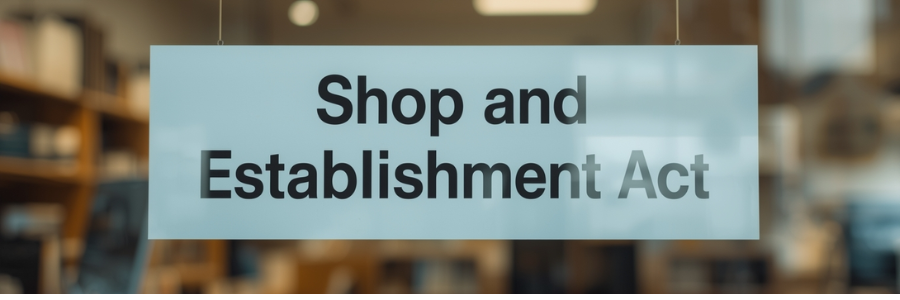Who Is Exempted from Obtaining the Mandatory Shop Establishment License?
To regulate the working conditions in any shop or establishment, businesses are required to obtain the compulsory shop license. It is state-specific legislation in India. Under the Shop Act, the established businesses are required to comply with the rules for employee rights. In short, it provides the rights of employees in the unorganized sector and commercial establishments. But various industries or establishments don’t need to verify through the shop and establishment registration. To ensure equitable enforcement, clarity on the registration exemptions is further crucial. This comprehensive guide will explore those entities that are exempt from securing the compulsory shop license in India. Read more in the next section.
1. Applicability of Shop and Establishment Registration
Before understanding who is restricted from obtaining the shop and establishment certificate, let’s take a look to know who is eligible to obtain it. The establishments that are covered under this act are
- Any type of shop or premises where goods are sold.
- The offices, godowns, and warehouses
- The commercial establishments included trade, businesses, or professions
- Other establishments include:
- Restaurants
- hotels
- theater
- residential hotels and lodges
- educational institutions
- medial establishments
- and other businesses
2. What does the Shop & Establishment Act cover?
The Act highlights the labor law for employees. The key aspects that are regulated by this Act are
- Working timeline and overtime
- Payment for the wages
- holidays and leave policy
- maternity leave and benefits
- prohibition of child labor
- cleanliness, lighting, and ventilation
- record-keeping
3. Factors That Determine Exemptions from Shop License
Multiple factors classify whether you need a shop establishment license or not. The key factors that determine the exemptions include
I) State-Governing Law
If another specific governing legislation covers the establishment, it is exempt from the shop and establishment registration.
For instance, companies that oversee factories and manufacturing facilities under the Factories Act of 1948 are not required to obtain a shop license. Restrictions also apply to organizations that are registered under the Mines Act of 1952.
II) Nature of Business
It is one of the common factors that determines the license requirement. The type of organization classifies whether your entity falls under the Shop and Establishment Act or not.
However, the offices under the central or state governments and local authorities are generally exempted from the shop and establishment license, except for commercial undertakings.
III) Employee Roles and Strengths
The specific roles of the individuals in the specific establishment lead to the exemptions from the Gumasta license registration. Those who hold the designation of a confidential, managerial, or supervisory character are not required to align with this act. The individuals who are connected with the intermittent work or employee threshold are also exempted.
Before registering in the same state, the number of employees is also important. For example, in Karnataka, the establishments require at least 10 or more employees before registration.
IV) Specific Business Activities
Often, the type of shops or services is exempted regarding operating hours or weekly days off due to their continuous nature of service.
4. Establishments that are Exempted From Shop License
Here is the state-wise exemptions table that mentions those industries or government offices that don’t need to obtain the shop registration certificate:
State / UT |
Common Exempted/Partially Exempt Establishments/Activities |
|
Delhi Shops and Establishments Act, 1954 (Delhi) |
|
|
Karnataka Shops and Commercial Establishments Act (Karnataka) |
|
|
Act on Shops and Establishments in Maharashtra |
Though the updated model SEA (2016) is generally the same as that of most other states, many states, such as Maharashtra, may have different thresholds for applicability and the number of employees; these differences may be determined by the number of employees or the type of establishment. |
|
Other States (general / model SEA-based rules) |
Many states may provide an exemption from SEA’s coverage (or only a limited application), for example, for small office buildings with only a handful of employees, or for facilities that are subject to other state regulations (factories or certain utility companies), or for specific government/publicly funded organizations. Due to there being a unique SEA adopted by each state, the types of several states will vary significantly, if not substantially, from state to state. |
Why Understanding Exemptions Matters?
The primary reason for understanding the exemption is that the businesses can ensure whether they are eligible for the shop and establishment registration at all. Many states’ jurisdiction decides the license requirement based on the number of employees, activity type, or location. It also helps to avoid the penalties, maintain the resources, and define the legal obligations. In short, comprehending exemptions allows a business operator to navigate the local regulatory framework efficiently.
Also Read: Digital Shop License: Does an Online Business Need Physical Registration?
Final Thoughts | The Shop and Establishment Act Applicability
Determining the rules and regulations for the shop license at the state level is crucial. To guarantee legal compliance, specific action must be taken; general advice is insufficient. Having the correct knowledge related to the Shop and Establishment Act, the entities can avoid unnecessary penalties or legal action. Adherence to the state-level jurisdiction ensures the proper documentation and license validity. To streamline the registration process, engage a trusted and experienced professional. Visit the LegalRaasta.com website for more details.
Frequently Asked Questions
a) What is the exemption of the shop and establishment?
Ans. The exemption from the shop establishment license determines that a specific business that comes under the central and state government, including local authorities, is exempted from the shop license. Various others don’t require obtaining the shop certificate.
b) What are the penalties for not registering under the Shop Establishment Act?
Ans. The penalty for non-compliance with the shop license depends on the specific state and the nature of the offense. For the late registration, the establishment may face a penalty of up to $100 to $1,000. Overall, the action for non-compliance depends on the violation’s severity and the specific state’s laws.
c) Who needs the Gumasta registration certificate?
Ans. The Gumasta license online, which is also known as the shop and establishment license in other states of India, except Maharashtra, is an important document for the business. Any business, including shops, traders, and commercial establishments, with employees in Maharashtra, is eligible for the Gumasta registration.
d) Can you get the loan with a shop license?
Ans. Yes, the shop establishment license is proof of business existence. It can be used for securing loans from banks.
e) How do shop license eligible get the government benefits?
Ans. This license is crucial for getting the government benefits, as it demonstrates business legitimacy.










